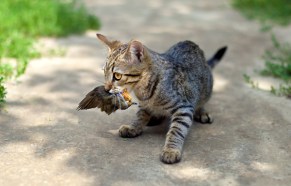Life
Sign up for our newsletter
We summarize the week's scientific breakthroughs every Thursday.
-
 Life
LifePigeons’ prominent plumage traces to one gene
A mutation responsible for ruffs, crests and collars appears to have arisen once and then passed among species through breeding.
-
 Animals
AnimalsCats kill more than one billion birds each year
New analysis doubles estimate of avian death tolls, revealing that hunting felines take bigger bite out of wildlife than expected.
By Susan Milius -
 Life
LifeGene variant makes flu particularly dangerous
People with one form of IFITM3 are more likely to develop pneumonia.
-
 Life
LifeCaribbean’s coral reefs approach tipping point
A survey of 19 colonies suggests many may soon begin to shrink.
-
 Life
LifeChimps’ baby teeth don’t predict weaning
The age at which a chimpanzee gets its first molar tooth doesn't predict when it will stop nursing.
By Erin Wayman -
 Humans
HumansU.S. team breaks through subglacial lake
Testing should continue for a day or more, probing for life in the Antarctic depths.
By Janet Raloff -
 Animals
AnimalsDung beetles steer by the Milky Way
The insects orient themselves using starlight, researchers find in planetarium experiments.
By Susan Milius -
 Life
LifeGroup to Group
Wild chimpanzees pick up ant-fishing behavior from a female immigrant.
By Erin Wayman -
 Humans
HumansH5N1 influenza research moratorium ends
Scientists lift self-imposed moratorium on research that would make avian flu transmissible among humans.
-
 Life
LifeStarchy diet may have transformed wolves to dogs
Gaining the ability to digest carbohydrates may have been an important step in domesticating dogs.
-
 Tech
TechDNA stores poems, a photo and a speech
The molecule swaps its biological role for a computational one, that of long-term data storage.
-
 Humans
HumansAncient human DNA suggests minimal interbreeding
Genetic analysis indicates Stone Age people mated infrequently with Neandertals and other close relatives.
By Bruce Bower